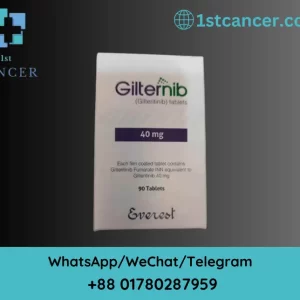In the landscape of hematologic oncology, Ibrutinib has emerged as a transformative agent, challenging traditional treatment paradigms and offering new hope for individuals grappling with certain hematologic malignancies.

This article explores the multifaceted aspects of Ibrutinib, delving into its introduction, background, mechanism of action, clinical uses, ongoing research, potential side effects, and the evolving trends that mark its trajectory in the dynamic field of oncology.
Introduction Ibrutinib Capsule (Ibutigen):
In the ever-evolving landscape of hematologic oncology, the introduction of Ibrutinib has marked a pivotal shift in treatment paradigms, ushering in a new era of precision therapy for various malignancies of the blood and lymphatic system. Developed as a Bruton’s tyrosine kinase (BTK) inhibitor, Ibrutinib represents a groundbreaking approach that targets specific signaling pathways within malignant B cells, offering newfound hope to patients grappling with conditions such as chronic lymphocytic leukemia (CLL), mantle cell lymphoma (MCL), and Waldenström macroglobulinemia.
A Departure from Conventional Approaches:
Historically, the landscape of hematologic malignancies has been shaped by conventional chemotherapy, a broad-spectrum approach that often affects both healthy and malignant cells. Ibrutinib Capsule, however, signifies a departure from this one-size-fits-all model. By selectively targeting BTK, a critical enzyme in B-cell signaling, Ibrutinib disrupts the specific pathways fueling the survival and proliferation of malignant B cells, presenting a paradigm shift towards precision medicine.
Revolutionizing B-Cell Signaling:
Central to Ibrutinib’s efficacy is its profound impact on B-cell signaling pathways. The drug’s mechanism of action involves the irreversible binding of Ibrutinib Capsule to BTK, preventing the downstream signaling events that sustain malignant B-cell growth. This precision targeting not only distinguishes Ibrutinib from conventional chemotherapy but also minimizes collateral damage to healthy cells, thereby improving the therapeutic index and mitigating adverse effects.
Clinical Breakthroughs Across a Spectrum of Malignancies:
Ibrutinib has demonstrated remarkable clinical success across a spectrum of hematologic malignancies, earning its place as a frontline therapy in CLL and MCL. The drug’s effectiveness extends to Waldenström macroglobulinemia and other B-cell lymphomas, broadening its applications and offering renewed optimism for patients facing these challenging conditions.
Pioneering Ongoing Research:
Beyond its current clinical applications, Ibrutinib continues to be at the forefront of pioneering research. Ongoing clinical trials explore its efficacy in combination therapies, its role in early-stage diseases, and its potential applications in diverse disease contexts. As researchers delve deeper into the intricacies of B-cell signaling, Ibrutinib Capsule remains a focal point of innovation, contributing to the evolving narrative of precision medicine in hematologic care.
A Balancing Act: Managing Potential Side Effects:
While Ibrutinib Capsule represents a transformative leap in hematologic oncology, its use is not without potential side effects. Understanding and managing these effects, such as bleeding tendencies, hypertension, and atrial fibrillation, are integral aspects of optimizing patient outcomes. Ongoing research aims to refine strategies for minimizing these risks and enhancing the overall safety profile of Ibrutinib.
Emerging Trends and Future Horizons:
As Ibrutinib Capsule continues to make strides in clinical practice, emerging trends and developments signal a future marked by its potential in combination therapies, novel disease contexts, and advancements in drug formulations. The evolving landscape reflects a commitment to precision medicine, with Ibrutinib poised to play a central role in shaping the future of hematologic oncology.
In conclusion, the introduction of Ibrutinib Capsule represents more than a new therapeutic option; it signifies a fundamental shift towards precision therapy in hematologic malignancies. As we unravel the intricate details of its mechanism, clinical applications, and ongoing research, Ibrutinib stands as a beacon of hope, illuminating the path towards more effective, targeted, and patient-centric care in the dynamic and challenging realm of hematologic oncology.
Background Ibrutinib Capsule (Ibutigen):
The origin of Ibrutinib Capsule is deeply rooted in a quest to revolutionize the treatment landscape for hematologic malignancies, driven by an understanding of the intricate signaling pathways that govern the growth and survival of malignant B cells. Developed as a Bruton’s tyrosine kinase (BTK) inhibitor, Ibrutinib represents a groundbreaking leap from traditional therapeutic approaches, offering a targeted strategy for conditions such as chronic lymphocytic leukemia (CLL), mantle cell lymphoma (MCL), and Waldenström macroglobulinemia.
The Crucial Role of BTK in B-Cell Signaling:
Central to the genesis of Ibrutinib is the recognition of the pivotal role played by BTK in B-cell signaling. BTK is a key enzyme in the B-cell receptor (BCR) signaling pathway, essential for transmitting signals that regulate B-cell growth and survival. In pathological conditions, such as hematologic malignancies, aberrations in this signaling cascade lead to uncontrolled proliferation of malignant B cells.
Understanding the Need for Targeted Therapies:
Traditional chemotherapy, while effective, is associated with broad-spectrum effects on both malignant and healthy cells, often resulting in significant side effects. The development of Ibrutinib was motivated by a desire to shift from these non-specific approaches to targeted therapies. Targeting BTK allows for a more precise intervention, disrupting the specific signaling pathways responsible for sustaining the survival and proliferation of malignant B cells.
Discovery and Development of Ibrutinib:
Ibrutinib was discovered and developed by scientists seeking to harness the potential of targeted therapy. The drug’s development was guided by a deepening understanding of the genetic and molecular underpinnings of hematologic malignancies. It was designed to specifically inhibit BTK by irreversibly binding to the enzyme, thereby disrupting the downstream signaling events that contribute to the pathogenesis of various B-cell disorders.
Clinical Validation and Regulatory Approvals:
The background of Ibrutinib is enriched by a series of clinical trials that validated its efficacy across different hematologic malignancies. Notably, clinical trials demonstrated significant improvements in outcomes for patients with CLL and MCL. These positive results paved the way for regulatory approvals, with Ibrutinib becoming a landmark drug in the treatment arsenal for certain hematologic conditions.
A New Dawn in Hematologic Oncology:
The advent of Ibrutinib has heralded a new era in hematologic oncology. Its background narrative embodies the transition from non-specific treatments to precision medicine, offering a targeted therapeutic option that addresses the specific molecular alterations driving B-cell malignancies. Ibrutinib’s journey from conceptualization to clinical application underscores the relentless pursuit of more effective, safer, and patient-tailored treatment options in the challenging realm of hematologic oncology.
Mechanism of Action Ibrutinib Capsule (Ibutigen):
At the core of Ibrutinib’s transformative impact on hematologic malignancies lies its unique mechanism of action, a sophisticated dance at the molecular level that disrupts key signaling pathways within B cells. This section delves into the intricacies of Ibrutinib’s mechanism, unraveling how this Bruton’s tyrosine kinase (BTK) inhibitor orchestrates a precision intervention, redefining the landscape of hematologic oncology.
1. Targeting Bruton’s Tyrosine Kinase (BTK):
- Ibrutinib’s primary target is BTK, a crucial enzyme in the B-cell receptor (BCR) signaling pathway. BTK plays a pivotal role in transmitting signals that regulate B-cell survival, proliferation, and differentiation. In hematologic malignancies, aberrant BTK signaling contributes to uncontrolled growth of malignant B cells.
2. Irreversible Binding to BTK:
- Ibrutinib Capsule exerts its effect by irreversibly binding to BTK. This binding is covalent and occurs at a cysteine residue within the enzyme, creating a sustained blockade of BTK activity. Unlike reversible inhibitors, Ibrutinib’s irreversible binding ensures a prolonged interruption of the BCR signaling cascade.
3. Disruption of Downstream Signaling:
- By binding to BTK, Ibrutinib Capsule disrupts downstream signaling events. BTK is involved in the activation of pathways such as the phosphoinositide 3-kinase (PI3K) and mitogen-activated protein kinase (MAPK) pathways, which are crucial for B-cell survival and proliferation. Ibrutinib’s interference impedes the transduction of these signals, hindering the sustenance of malignant B-cell growth.
4. Inhibition of Cell Adhesion and Migration:
- Ibrutinib’s impact extends beyond signaling pathways. It inhibits the adhesion and migration of malignant B cells, limiting their ability to interact with the microenvironment that supports their growth. This disruption of cell adhesion further contributes to the drug’s anti-cancer effects.
5. Preservation of Healthy B Cells:
- Importantly, Ibrutinib’s precision extends to sparing normal, healthy B cells. Traditional chemotherapy often affects both malignant and non-malignant cells, leading to side effects. Ibrutinib’s targeted approach allows the preservation of normal B cells, minimizing collateral damage and improving the overall tolerability of the treatment.
6. Overcoming Resistance Mechanisms:
- Ibrutinib Capsule has demonstrated efficacy in overcoming certain resistance mechanisms observed in hematologic malignancies. Its irreversible binding to BTK prevents the development of mutations that might confer resistance to the drug, enhancing its durability and effectiveness over prolonged treatment periods.
7. Impact Across Multiple Malignancies:
- The precision of Ibrutinib’s mechanism contributes to its broad-spectrum effectiveness. It has shown clinical success across a range of B-cell malignancies, including CLL, MCL, and Waldenström macroglobulinemia, highlighting the versatility of its targeted approach.
Ibrutinib’s mechanism of action represents a sophisticated intervention at the molecular crossroads of B-cell signaling. By selectively targeting and irreversibly inhibiting BTK, Ibrutinib disrupts the intricate dance of signaling events that sustain malignant B-cell growth, offering a paradigm-shifting approach to hematologic oncology that prioritizes precision, efficacy, and reduced toxicity.
Clinical Uses of Ibrutinib Capsule (Ibutigen):
Ibrutinib Capsule, a Bruton’s tyrosine kinase (BTK) inhibitor, has established itself as a transformative force in the realm of hematologic oncology. Its clinical uses span a spectrum of B-cell malignancies, offering renewed hope to patients facing conditions where traditional treatments may fall short. This section outlines the diverse clinical applications of Ibrutinib, showcasing its efficacy and versatility in managing various hematologic disorders.
1. Chronic Lymphocytic Leukemia (CLL):
- Ibrutinib Capsule stands as a cornerstone in the treatment of CLL, particularly in the relapsed or refractory setting. As a monotherapy or in combination with other agents, it has demonstrated impressive results, providing prolonged remissions and improved survival outcomes. Its effectiveness has also led to its adoption as a frontline therapy, changing the landscape of CLL treatment paradigms.
2. Mantle Cell Lymphoma (MCL):
- MCL, known for its aggressive nature, has witnessed a paradigm shift with the incorporation of Ibrutinib Capsule into treatment regimens. Whether used as a monotherapy or in combination with other agents, Ibrutinib has shown remarkable efficacy, leading to improved response rates and progression-free survival in patients with MCL, including those who have relapsed after prior therapies.
3. Waldenström Macroglobulinemia:
- Ibrutinib has emerged as a valuable therapeutic option for Waldenström macroglobulinemia, a rare form of lymphoma characterized by the presence of abnormal B cells in the bone marrow. Its ability to target BTK has shown significant clinical benefit, providing an alternative for patients who may not be suitable candidates for traditional therapies.
4. Diffuse Large B-Cell Lymphoma (DLBCL):
- In specific subtypes of DLBCL, where the activated B-cell (ABC) molecular subtype is prevalent, Ibrutinib has demonstrated promising results. Its application in combination with standard chemoimmunotherapy regimens is under investigation, representing a potential expansion of its clinical uses.
5. Marginal Zone Lymphoma (MZL):
- Ibrutinib Capsule has shown efficacy in treating relapsed or refractory marginal zone lymphoma, another indolent B-cell lymphoma subtype. Its mechanism of action, targeting the BTK pathway, makes it a compelling option for patients with MZL who have exhausted other treatment alternatives.
6. Chronic Graft-versus-Host Disease (cGVHD):
- Beyond B-cell malignancies, Ibrutinib Capsule has found utility in the management of chronic graft-versus-host disease (cGVHD) following allogeneic stem cell transplantation. Its immunomodulatory effects contribute to the control of cGVHD symptoms, offering a potential therapeutic avenue in this challenging post-transplant complication.
7. Ongoing Exploration and Clinical Trials:
- Clinical uses of Ibrutinib Capsule are not static; ongoing research explores its application in various contexts. Trials investigate its role in combination therapies, in early-stage diseases, and across a broader spectrum of hematologic disorders, promising further expansions in its clinical utility.
In essence, Ibrutinib’s clinical uses exemplify a paradigm shift in the management of hematologic malignancies. Its efficacy across a diverse range of disorders, from CLL to MCL and beyond, highlights its versatility and underscores its position as a pioneering agent in the evolving landscape of hematologic oncology.
Clinical Trials and Research of Ibrutinib Capsule (Ibutigen):
Ibrutinib Capsule, a trailblazing Bruton’s tyrosine kinase (BTK) inhibitor, has not rested on its laurels since entering the clinical arena. Ongoing clinical trials and research initiatives continue to unravel new facets of its potential, refining its applications, exploring novel combinations, and advancing our understanding of its role in hematologic oncology. This section sheds light on the dynamic landscape of Ibrutinib’s ongoing exploration through clinical trials and research endeavors.
**1. Combination Therapies:
- Synergies to Enhance Efficacy
Clinical trials investigate Ibrutinib’s potential in combination with other therapeutic agents. Combinations with immunomodulatory drugs, anti-CD20 monoclonal antibodies, and other targeted therapies are under scrutiny. These trials aim to uncover synergistic effects, potentially enhancing the overall efficacy of treatment and offering new avenues for combination therapies in various hematologic malignancies.
**2. Early-Stage Diseases:
- Shifting the Treatment Paradigm
Research endeavors extend to exploring Ibrutinib’s role in early-stage diseases. Trials are underway to assess its efficacy as a frontline treatment, potentially reshaping the traditional treatment paradigms. Early intervention with Ibrutinib Capsule may lead to improved outcomes and redefine the standards of care in certain hematologic malignancies.
**3. Expanding Disease Contexts:
- Beyond Established Indications
Beyond its established uses, ongoing research seeks to explore Ibrutinib’s efficacy in new disease contexts. Investigations into its application in other B-cell malignancies, including specific subtypes of diffuse large B-cell lymphoma (DLBCL), aim to broaden its clinical footprint, potentially offering new treatment options for patients with diverse hematologic disorders.
**4. Pediatric Hematology:
- Extending the Reach to Younger Populations
Recognizing the need for effective treatments in pediatric hematology, ongoing studies assess Ibrutinib’s safety and efficacy in children. This research acknowledges the unique considerations in pediatric populations, paving the way for potential extensions of its clinical uses to younger patients.
**5. Mechanistic Studies:
- Unraveling Molecular Mechanisms
Mechanistic studies delve into the intricate details of Ibrutinib’s effects at the molecular level. Understanding how Ibrutinib Capsule interacts with signaling pathways, the impact on the tumor microenvironment, and its immunomodulatory effects contributes to a more nuanced comprehension of its mechanisms and potential refinements in its clinical application.
**6. Resistance Mechanisms:
- Strategies to Overcome Resistance
Recognizing the potential development of resistance mechanisms, ongoing research explores strategies to overcome or mitigate resistance to Ibrutinib Capsule. Understanding the factors contributing to resistance is crucial for optimizing long-term treatment outcomes and maintaining the drug’s effectiveness over extended periods.
**7. Real-world Evidence Studies:
- Building a Comprehensive Understanding
Real-world evidence studies contribute to the growing body of knowledge regarding Ibrutinib’s performance in diverse patient populations. These studies offer insights into its long-term safety and efficacy profiles in real-world clinical settings, providing a valuable complement to data derived from controlled clinical trials.
As Ibrutinib Capsule continues to undergo scrutiny in the crucible of ongoing clinical trials and research initiatives, the evolving landscape holds promise for refinements in its applications, expansions into new disease contexts, and an enriched understanding of its mechanisms. The dynamic interplay between scientific inquiry and clinical practice positions Ibrutinib at the forefront of innovation in hematologic oncology.
Potential Side Effects of Ibrutinib Capsule (Ibutigen):
While Ibrutinib Capsule stands as a beacon of hope in the treatment of hematologic malignancies, its clinical use is accompanied by potential side effects. Understanding and managing these side effects are integral aspects of optimizing patient outcomes. This section provides an overview of the potential side effects associated with Ibrutinib, ranging from common adverse events to less frequent but significant considerations.
**1. Bleeding Events:
- Understanding the Risk
One of the notable side effects associated with Ibrutinib Capsule is an increased risk of bleeding events. This can manifest as bruising, petechiae, and, in some cases, more severe hemorrhagic events. The mechanism behind this heightened bleeding risk is linked to Ibrutinib’s interference with platelet function. Patients on Ibrutinib Capsule should be monitored for signs of bleeding, and caution is advised in individuals with a history of bleeding disorders.
**2. Hypertension:
- Managing Elevated Blood Pressure
Hypertension is another common side effect observed with Ibrutinib Capsule. The drug has been associated with an increased incidence of elevated blood pressure. Regular monitoring of blood pressure is essential during Ibrutinib Capsule therapy, and antihypertensive medications may be required to manage hypertension effectively.
**3. Atrial Fibrillation:
- Cardiovascular Considerations
Ibrutinib Capsule has been linked to an increased risk of atrial fibrillation, a cardiac arrhythmia. This side effect is particularly significant as atrial fibrillation can have implications for cardiovascular health. Regular cardiac monitoring is advised, and patients should report any symptoms suggestive of arrhythmias, such as palpitations or dizziness.
**4. Infections:
- Immunomodulatory Effects
Ibrutinib’s immunomodulatory effects can impact the immune system’s ability to defend against infections. Patients may experience an increased susceptibility to various infections, including respiratory and urinary tract infections. Vigilant monitoring for signs of infection and prompt intervention are crucial to manage this potential side effect.
**5. Diarrhea:
- Gastrointestinal Distress
Diarrhea is a common gastrointestinal side effect associated with Ibrutinib Capsule. It is typically manageable, but severe cases may require dose adjustments or temporary discontinuation of the drug. Adequate hydration and anti-diarrheal medications may be prescribed to alleviate symptoms.
**6. Musculoskeletal Pain:
- Addressing Discomfort
Musculoskeletal pain, including arthralgia and myalgia, is reported by some individuals taking Ibrutinib Capsule. Pain management strategies and communication with healthcare providers can help address discomfort and optimize the patient’s overall experience with the medication.
**7. Cytopenias:
- Monitoring Blood Cell Counts
IIbrutinib Capsule may lead to cytopenias, including thrombocytopenia, neutropenia, and anemia. Regular monitoring of blood cell counts is essential, and dose modifications may be implemented to manage these hematologic side effects. Close collaboration with healthcare providers ensures appropriate adjustments in the treatment plan.
**8. Other Adverse Events:
- Diverse Considerations
Less frequent but potentially significant side effects may include rash, nausea, and fatigue. These events should be communicated to healthcare providers for assessment and appropriate management.
Understanding the potential side effects of Ibrutinib Capsule is crucial for both healthcare providers and patients. This knowledge allows for proactive monitoring, timely intervention, and collaborative decision-making to optimize the balance between therapeutic benefits and potential risks associated with this innovative hematologic oncology treatment. Patients are encouraged to communicate openly with their healthcare team to ensure a comprehensive and individualized approach to their care.



